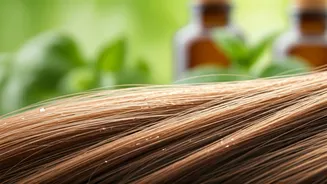Hair Growth Basics
Hair growth is a fascinating biological process that is heavily influenced by a variety of factors. At its core, hair growth occurs in cycles: the anagen
phase (growth), catagen phase (transition), and telogen phase (resting and shedding). This cycle is managed in the hair follicle, a structure nestled in the skin. Genetics play a pivotal role, with inherited traits dictating hair type, texture, and growth rate. Hormonal shifts, stemming from puberty, pregnancy, or aging, can significantly impact hair growth, leading to temporary or permanent changes in hair thickness or loss. Moreover, nutritional intake is a crucial determinant; adequate consumption of vitamins, minerals, and proteins is essential for maintaining robust hair health and fostering growth. Stress, illness, and certain medical conditions can disrupt the growth cycle, thereby resulting in increased hair fall. Understanding these foundations is the initial step towards efficiently promoting and preserving healthy hair.
Nutrition's Role
The food we consume directly impacts hair health, making it an essential component of the hair growth process. Proteins form the foundation of hair structure, and a shortage can lead to thinning and brittleness. Iron, crucial for carrying oxygen to hair follicles, promotes growth and prevents hair loss. Vitamins, particularly B vitamins, support hair production, while vitamin D has been linked to follicle cycling. Zinc and selenium also aid in hair tissue repair and growth. A balanced diet filled with lean proteins, fruits, vegetables, and whole grains ensures the body receives the necessary nutrients. Deficiencies in any of these crucial elements can slow down growth and impair hair quality. To maximize hair health, focus on incorporating nutrient-rich foods into your diet.
Lifestyle's Impact
Lifestyle choices greatly influence hair health and growth. High stress levels can disrupt the hair growth cycle, resulting in hair shedding. Regular exercise improves circulation, bringing crucial nutrients to hair follicles. Sufficient sleep is essential for overall health, including hair growth. Harsh hair treatments like excessive heat styling and chemical processing can weaken hair and lead to breakage. Protecting hair from environmental damage, such as sun exposure and pollution, is also essential. Making conscious choices, such as incorporating stress-reducing activities, adopting a regular exercise routine, and ensuring adequate sleep, supports healthier hair. Simple adjustments to your daily routine can make a significant difference in enhancing your hair's natural growth process and overall health.
Common Misconceptions
Several misconceptions persist regarding hair growth. The idea that frequent haircuts make hair grow faster is not true; haircuts primarily affect hair ends and appearance, not the growth rate. Similarly, expensive products don't automatically guarantee better hair growth; effectiveness depends on individual hair needs and ingredients. Genetic factors predominantly determine hair growth, overriding the impact of many external products or practices. Additionally, hair growth supplements, while often promoted, do not always provide benefits; their effectiveness varies, and potential risks and side effects should be considered. Understanding the science behind hair growth and dispelling common myths allows for more educated choices and realistic expectations. Prioritizing a holistic approach that focuses on proper nutrition, lifestyle, and gentle hair care is more likely to yield positive results.
Practical Hair Care
Effective hair care practices significantly aid in promoting hair health and growth. Gentle washing with sulfate-free shampoos is advised to avoid stripping the hair of its natural oils. Regular conditioning and deep conditioning treatments are vital to hydrate and nourish the hair. Avoiding harsh chemicals, such as those found in perms and dyes, minimizes damage. Minimizing heat styling tools, like hair dryers and straighteners, preserves hair integrity. Proper detangling techniques, using a wide-toothed comb, prevent breakage. Massaging the scalp boosts blood flow, enhancing hair growth. Adopting these practices establishes a foundation for healthy hair care. By integrating these simple yet effective steps, you can significantly support hair health and nurture its natural growth potential, promoting stronger, healthier hair.














